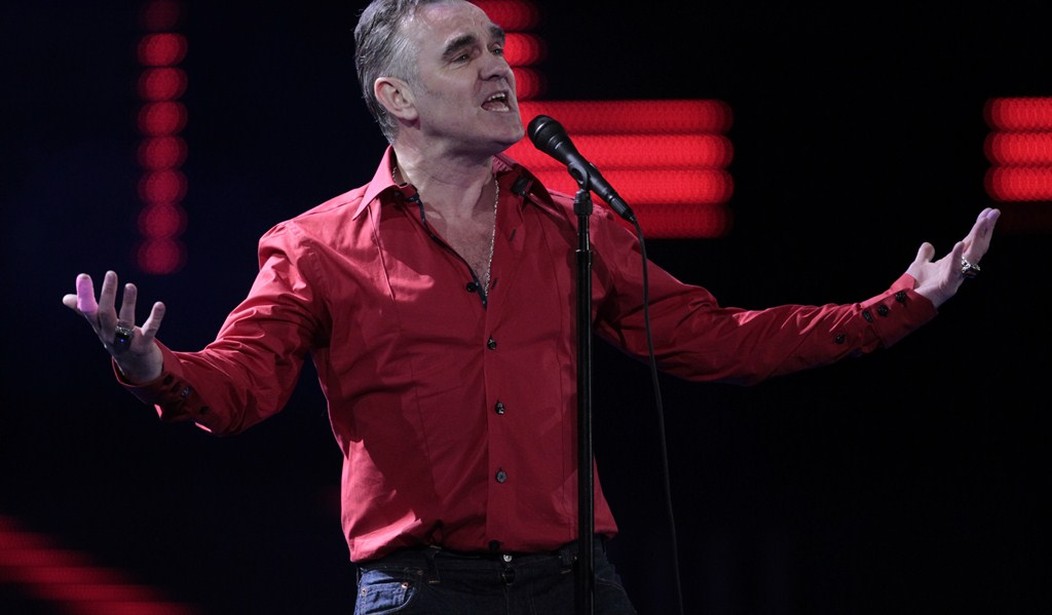That’s the other Morrissey — Steven Patrick Morrissey, formerly the lead singer for The Smiths, and a routinely outspoken celebrity on politics. Morrissey grew up in Manchester, and had been celebrating his birthday when the Islamist terror attack took place at an Ariana Grande concert, killing 22 people including the suicide bomber. Late yesterday, Morrissey ripped the British government for its low-key rhetorical response, accusing officials from Theresa May down of hypocrisy for not calling out terrorism and doing more to stop it:
Theresa May says such attacks “will not break us”, but her own life is lived in a bullet-proof bubble, and she evidently does not need to identify any young people today in Manchester morgues. Also, “will not break us” means that the tragedy will not break her, or her policies on immigration. The young people of Manchester are already broken – thanks all the same, Theresa.
Sadiq Khan says “London is united with Manchester”, but he does not condemn Islamic State – who have claimed responsibility for the bomb. The Queen receives absurd praise for her ‘strong words’ against the attack, yet she does not cancel today’s garden party at Buckingham Palace – for which no criticism is allowed in the Britain of free press. Manchester mayor Andy Burnham says the attack is the work of an “extremist”.
An extreme what? An extreme rabbit?
Morrissey then turned his ire on everyone else in the UK for not speaking out about the threat everyone acknowledges:
In modern Britain everyone seems petrified to officially say what we all say in private. Politicians tell us they are unafraid, but they are never the victims.
Interestingly, Morrissey also neglects to specify the motive in his post, but that wasn’t enough to avoid drawing criticism for speaking out against it. The Daily Mail aggregated a number of sharp responses to Morrissey’s statement, calling him an “embarrassment” and accusing him of an intention “to incite racial violence,” which seems a little ironic under the circumstances. Rolling Stone merely noted that Morrissey had departed from the line taken by most other celebrities:
Morrissey’s note is one of the sharpest to arise in the wake of the attacks. Other artists and entertainers that have expressed their sorrow and support include Late Late Show host James Corden, Katy Perry, Harry Styles, Taylor Swift and Missy Elliot, as well as Morrissey’s fellow Manchester natives and local scene stalwarts Liam Gallagher, Johnny Marr and Peter Hook.
Actually, Katy Perry’s initial reaction took some heat as well. Perry called for open borders and the “need to coexist”:
Katy Perry said she felt “devastated” following the terrorist attack outside an Ariana Grande concert in Manchester, England Monday. Speaking with radio host Elvis Duran, Perry said, “I think the greatest thing we can do now is unite as people, as fan bases, all of it. Whatever we say behind people’s backs, the Internet can be a little bit ruthless as far as fan bases go but I think that the greatest thing we can do is just unite and love on each other. No barriers, no borders, we all just need to co-exist.”
The Daily Wire called this response an “insult,” and responded with one of its own:
Katy Perry, who has time and again made no secret of her double-digit IQ, gave another display of her distance from reality after the massacre committed by an Islamic terrorist in Manchester, England at an Ariana Grande concert on Monday night.
In an interview on Tuesday with Elvis Duran on Elvis Duran and the Morning Show, Perry offered her profound advice: “Just unite and love on each other.” That would have been insulting enough after knowing that some Islamic fanatic had murdered and maimed children with nails, but there was more; Perry and Duran lived in their own world in which the only thing that seemingly mattered was that the fan bases of Perry and Ariana Grande get along, and that the best answer to Islamic terrorism was to simply produce more concerts.
Basically, Morrissey was criticizing this very response, in which the real threats get pushed to the background and responsibility falls on everyone else, along with vapid and ambiguous appeals to ignore the obvious. Whether or not one agrees with his take, he’s correct that it’s been clear for some time that rushing to take down borders and expressing the need for co-existence isn’t doing much for stopping radical Islamist terrorism. In the short run, it’s arguably made it easier.
Morrissey goes wrong in making it personal with May, the Queen, and others (which is not surprising for anyone who’s paid attention to his political pronouncements). One does not need to be related to the victims to feel sorrow and outrage over the attack, as the attention around the world to this atrocity demonstrates. The very “bubble” that Morrissey cites for those public figures exists because they are targets for extremists and nutcases of all kinds. Morrissey might recall the assassination of the Queen’s cousin Louis Mountbatten, who was assassinated by the IRA in 1979, as one example in particular. Of course, no one had to wonder at that time whether the perpetrators were “an extreme rabbit,” either.
Both singers manage to get this wrong to some degree. However, Morrissey gets closer to the mark than Perry, and the “known wolf” status of the suicide bomber and the roll-up of his apparent network of terrorists should make that plain.








Join the conversation as a VIP Member